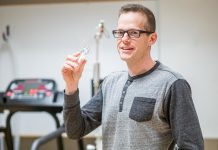Link between gastric bypass surgery and improvements in diabetes revealed a hormone that may be used to treat type 2 diabetes.

Researchers at the Norwegian University of Science and Technology (NTNU) and Oxford University have found a hormone that may offer an effective treatment for type 2 diabetes.
The incidence of diabetes, especially type 2 diabetes, has skyrocketed over the last few decades, according to a report from the World Health Organization. The report says that there were 108 million adults with diabetes in 1980, but by 2014, that number had grown to 422 million.
“Many people who are morbidly obese also have type 2 diabetes,” says Magnus Kringstad Olsen, a PhD candidate at the Department of Cancer Research and Molecular Medicine at NTNU who was part of the research team.
Gastric bypass surgery is the most effective form of weight loss for the morbidly obese. Patients who undergo the surgery also show great improvements in their diabetes after surgery. Many scientists have wondered why.
Continue Reading Below ↓↓↓
Researchers have long believed that the remisssion in type 2 diabetes after bariatic surgery is due to the increased production of GLP-1, an appetite-reducing hormone, says Olsen.
But researchers from NTNU and Oxford discovered that another hormone called PYY has many of the characteristics that cause this effect. The research was done using rats.
The finding offers the possibility that drugs could be used to stimulate the production of the hormone to treat type 2 diabetes.
Professor Duan Chen was head of the NTNU group that undertook the study in cooperation with the Oxford Centre for Diabetes, Endocrinology and Metabolism at the University of Oxford.
Reference: Reshma D. Ramracheya, Laura J. McCulloch, Anne Clark, David Wiggins, Helene Johannessen, Magnus Kringstad Olsen, Xing Cai, Chun-Mei Zhao, Duan Chen, Patrik Rorsman. PYY-Dependent Restoration of Impaired Insulin and Glucagon Secretion in Type 2 Diabetes following Roux-En-Y Gastric Bypass Surgery. Cell Reports. 3 May 2016. DOI:10.1016/j.celrep.2016.03.091
Source: Norwegian University of Science and Technology
Journal: Cell Reports
Funder: Diabetes UK RD Lawrence Fellowship, Oxford BRC/NIHR, Wellcome Trust, Knut and Alice Wallenberg Foundation, Swedish Research Council, European Union, and others











